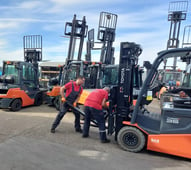Digitalisation is no longer a trend; it’s a necessity in the logistics sector. As supply chains grow more complex and customer expectations rise, companies are turning to digital tools to enhance efficiency, visibility and responsiveness. In a series of interviews taken at Logiconomi 2025, we talk with executive leaders from Blooloc, Shippeo and Toyota Material Handling Europe about how digitalisation is transforming logistics operations and what technologies are driving the change.
Data, the new gold
Ivo Vandeweerd, CEO of Blooloc, believes digitalisation starts with data: “Digitalisation is all about data. Data really is the new gold. It all starts with using data for problem diagnosis. A next level in utilising data is predictive analysis, and the final step involves prescriptive analytics, where data helps you decide what to do in real-time.”
Companies that move through these levels of data maturity will gain a competitive edge, Ivo further explains, “The companies that do this will be more successful because they’ll be more efficient and have much better security.”
Blooloc’s real-time location system is a prime example of this approach. “For the first time in history,” he continues, “you get a real-time view of what is happening in your warehouse. If you know the position, direction and speed of all forklifts, you can optimise routes and prevent collisions.”

Having such a wealth of information at their disposal not only improves safety but also enables smarter task allocation, like picking up a pallet that’s headed in the same direction, which boosts both efficiency and productivity.
Real-time visibility and connected technologies
Wesley Haaksma, Strategic Account Executive at Shippeo, emphasises that real-time supply chain visibility is no longer optional: “We’re living in a turbulent world where labour shortages, geopolitical disruptions and climate change present huge challenges. Supply chain executives need to know where their goods are and when they’ll arrive.”
 To meet this need, companies are adopting a wide range of technologies. Wesley continues: “Think about RFID tags, telematics devices in trucks, AIS technology on ships, or IoT sensors for temperature and humidity. These tools provide the data needed to understand what’s happening in your supply chain.”
To meet this need, companies are adopting a wide range of technologies. Wesley continues: “Think about RFID tags, telematics devices in trucks, AIS technology on ships, or IoT sensors for temperature and humidity. These tools provide the data needed to understand what’s happening in your supply chain.”
But the real power lies in integration. “At Shippeo,” he adds, “we connect and aggregate all these technologies to provide a single, global view of the supply chain in real-time.” This unified visibility enables faster decision-making, better risk management and a more agile response to disruptions.
Fleet productivity is another area where digitalisation is making a difference. According to Haaksma, telematics devices allow you to measure driver performance, optimise routes and reduce CO₂ emissions. “It’s about using data to make smarter and more cost-effective decisions,” he concludes.
Connecting the dots for smarter operations
Cecilia Nilsson, Director of Digital Business & Connectivity at Toyota Material Handling Europe, highlights the growing complexity of logistics. “The industry is facing higher demands and has more assets to manage. Manual processes just don’t cut it anymore. Digitalisation,” she says, “is the key to managing this complexity. It gives us tools to act. It gives us more data, and with that data, we have the responsibility to improve the logistics industry.”
Stressing the importance of integration, Cecilia continues: “To improve productivity, you need to connect the dots between your material handling equipment, your people and your operations. That’s when you can start being proactive and predictive. Predictive analysis in particular is a game-changer. It allows you to simulate different scenarios, act fast and improve quickly. You can predict failures, optimise flows and make smarter decisions every step of the way.”
Furthermore, the importance of cooperation is emphasised: “Toyota is just one part of the logistics puzzle. We recently launched Logiconomi Connections and we’re here to partner with startups and innovators so we can offer stronger solutions to our customers.”
Enabling sustainable performance
Logiconomi is a communication platform, created by Toyota Material Handling Europe, to identify and understand challenges, trends and emerging technologies in the logistics industry. The aim is to support all players active in the logistics industry with insights and inspiration for improved logistics operations.
Discover more trends as we uncover more interviews in this blog series or in our latest trend report.





